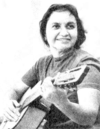San Carlos, Chile
San Carlos is the name of a city and commune (Spanish: comuna) of Punilla Province in the Ñuble Region of Chile.
Its countryside is reputed for its bountiful production of various crops as well as orchards (apple, grapes, berries, and more recently, kiwi).
The summers are hot and mainly dry (November to March) with temperatures reaching up to 34 °C (93 °F) on the months of December, January and February.
The city was founded by a Spaniard, don José Joaquín del Pino de Rozas y Negrete on July 3, 1800.
Among the city’s attractions lies the Medialuna of San Carlos which is a sports arena where the Chilean rodeo is practiced.
The commune has a public library, established on October 17, 1983, named after Eusebio Lillo, as well as a branch located in the 11 de Septiembre neighborhood, which was created in 1997 through a project funded by the National Fund for Culture and Arts (FONDART), both in the communal capital.
The secondary education establishments are: According to the 2002 census, 25,141 residents of San Carlos commune aged 15 years or older identified themselves as Catholics, equivalent to 68.51% of the total population, while 22.01% described themselves as Evangelical protestants, 0.59% as Jehovah's Witnesses and 1.35% as Latter-day Saints.
San Carlos is the birthplace of one of the most widely recognized names in Chilean and Latin American folk music, Violeta Parra.
As a commune, San Carlos is a third-level administrative division of Chile administered by a municipal council, headed by an alcalde who is directly elected every four years.
The commune is represented in the Senate by Alejandro Navarro Brain (MAS) and Hosain Sabag Castillo (PDC) as part of the 12th senatorial constituency (Biobío-Cordillera).
San Carlos is twinned with the Spanish city of Baena located in Andalucia, southern Spain, in the province of Córdoba.
San Carlos' founder, José Joaquín del Pino de Rozas y Negrete, was born in Baena.

